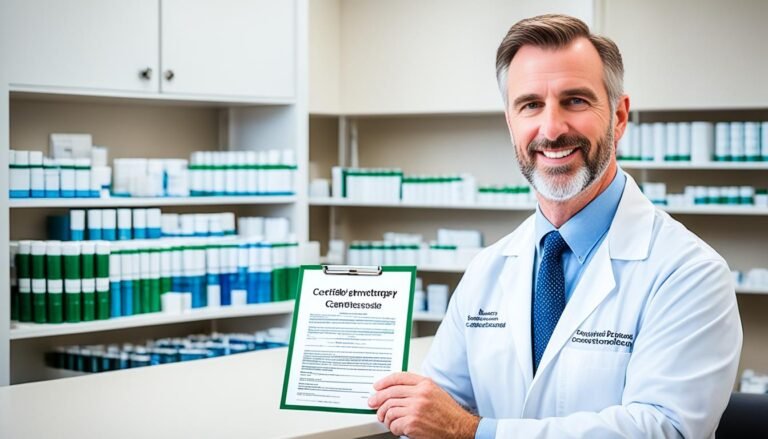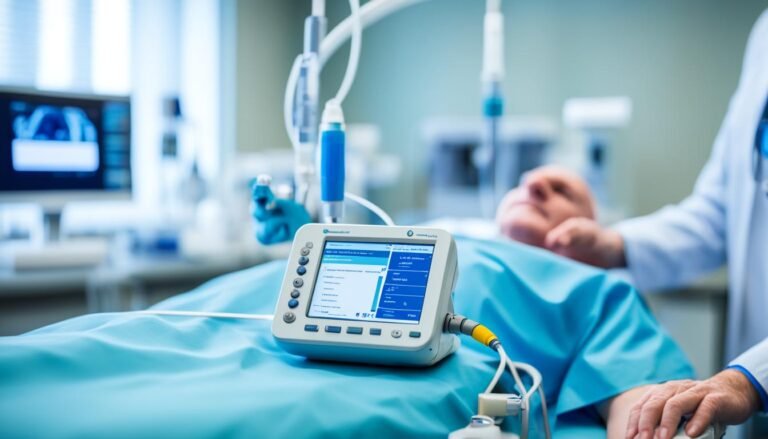What is Involved in a Doctorate in Medical Studies?
Ever wondered how to earn a Doctorate in Medical Studies? It’s not just about clinical education. It also covers in-depth healthcare leadership. So, what do students study, what are the goals, and what are the job prospects after? Let’s dive into the details of this advanced degree.
Key Takeaways:
- A Doctorate in Medical Studies bridges the gap between clinical education and healthcare leadership.
- Graduation requirements typically include coursework, original research, and a dissertation defense.
- Graduates of this program can pursue rewarding career opportunities in healthcare leadership roles.
- Choosing the right program and understanding the curriculum is crucial to success.
- Financial planning and exploring funding options are important considerations when pursuing a Doctorate in Medical Studies.
What is a Doctor of Medical Science?
A Doctor of Medical Science (DMSc) degree combines advanced healthcare training with leadership skills. Unlike a Ph.D. in medical science, it focuses more on applying knowledge than doing research. Its main aim is to connect what doctors learn in clinics with how they can lead in healthcare.
It is designed mainly for physician assistants but welcomes healthcare pros from other fields too. This program mixes real-world medical experience with how to lead. So, its graduates are ready to step into leadership roles in healthcare settings.
Getting a DMSc makes healthcare professionals better at both treating patients and running healthcare organizations. They learn to think critically, manage well, and make strategic plans. These are crucial skills for leading healthcare teams.
The DMSc degree also lets healthcare pros spark change in the medical world. They become skilled at innovating, improving care for patients, and making processes smoother. Thanks to their knowledge and training, DMSc grads can lead changes in healthcare.
Benefits of a DMSc Degree
A DMSc degree offers many advantages:
- Advanced Leadership Skills: It teaches how to lead well in healthcare, making good decisions that help everyone.
- Integration of Clinical Knowledge and Administrative Expertise: You learn to mix medical practice with management, understanding how healthcare works from both sides.
- Expanded Career Opportunities: It opens doors to many leadership jobs in healthcare, where you can really make a difference for patients and the organization.
- Professional Networking: This program connects you with other healthcare workers. This helps in sharing ideas and finding future job opportunities.
The DMSc degree is a great asset for healthcare workers who dream of leading. It equips you with the knowledge, skills, and connections needed to succeed in the complex world of healthcare.
| Key Features of a DMSc Degree | Benefits |
|---|---|
| Advanced healthcare leadership training | – Equips professionals with skills for effective leadership |
| Integration of clinical and administrative knowledge | – Comprehensive understanding of healthcare processes |
| Opportunities to specialize in specific healthcare areas | – Alignment with individual interests and career goals |
| Access to an extensive network of healthcare professionals | – Collaboration and knowledge exchange |
| Wide range of career opportunities in healthcare leadership | – Positive impact on patient care and organizational outcomes |
The Importance of a DMSc Degree
In today’s changing healthcare world, good leadership is key for new ideas and better care. Those with a Doctor of Medical Science (DMSc) degree can lead in this dynamic field. They have the skills to face healthcare’s tough challenges.
With a DMSc, leaders understand the system’s needs and how to reach its goals. This understanding helps them make choices that better patient care and use resources wisely.
A DMSc degree is great for learning how to lead across different areas in healthcare. It teaches professionals to think deep, understand healthcare setups, and work well with different teams. By knowing about many healthcare fields, these graduates can make things run smoother, improve how people talk, and create new and better ways of doing things.
“A DMSc degree is not just about acquiring knowledge; it’s about transforming that knowledge into action. It equips healthcare professionals with the skills they need to set visionary goals, build resilient organizations, and develop strategies that balance the complexity of the healthcare sector.”
A DMSc degree shows how dedicated and skilled someone is in leading healthcare. It proves to others that this person has studied hard and is ready to lead in healthcare.
The Value of DMSc Leadership in Healthcare
Being a good leader in healthcare is crucial. DMSc grads have what it takes to solve big healthcare problems and make things better. By focusing on the patient, making things work well, and working with different teams, they can really change the game.
Beyond leading teams, DMSc leaders can help shape policies, do research, and push for better healthcare laws. Their knowledge in leadership lets them tackle big issues, support facts, and push for actions that make healthcare better for everyone.
The Future of Healthcare Leadership
There’s a growing need for leaders who understand healthcare well, thanks to the field’s increasing complexity. DMSc grads can lead in many places, from hospitals to research labs. They are ready to make a difference in healthcare leadership.
Getting a DMSc degree opens up new chances for growth and success in healthcare. It lets professionals make the healthcare system better, improve how patients are cared for, and lead positive changes in their workplaces.
What to Look for in a DMSc Program
Choosing the right DMSc program means looking closely at several key points. You want to make sure it fits your needs well. Here’s what to focus on:
Program Requirements
First, check if you meet the admission and prerequisite requirements. Make sure you have the needed qualifications or certifications. Confirm that the program fits your background.
Curriculum
Look into the curriculum deeply. See if it offers what you want to learn. Find courses that match your career and interests. A mix of theory and practical learning makes a good program.
Program Faculty
Next, look at the program’s faculty. Their skills and knowledge can define your learning. They should be experts in healthcare leadership. This will help boost your education.
Flexibility of Program Delivery
Consider how flexible the program is. Can you study online or part-time to fit your life? This matters if you’re working or have other commitments. Also, think about location if you need to be on campus.
Cost and Financial Aid Options
Check the program’s cost against your budget. Look for financial aid like scholarships or employer help. This can ease the financial load of your studies.
Research these points well before picking a DMSc program. Make sure it meets your career and personal needs. Take advice from reliable sources. And explore all your options thoroughly.
The Doctor of Medical Science Degree Program
The Doctor of Medical Science (DMSc) degree program is made for physician assistants (PAs) advancing in healthcare. It helps improve leadership and problem-solving skills. The knowledge you gain is vital for clinical practice and leading others in these fields.
Tailored Studies and Specializations
Students in the DMSc program can pick what they want to study based on their interests in healthcare. They choose between focusing on working directly with patients or leading in clinical settings. This choice makes their studies fit their career dreams, making them experts in their area.
Duration and Credit Requirements
This program usually takes four semesters to finish, offering a quicker way to earn a doctorate. To complete it, you must do at least 36 credit hours of work. The courses are designed to give you a strong education. This education helps you succeed in clinical jobs and as leaders in health care.
Open to Licensed Physician Assistants
It’s open to licensed physician assistants wanting to grow their knowledge and job options. This program helps PAs know more about clinical work and leadership. Other health professionals might choose a degree in health science (DHSc) instead. This fits their backgrounds and goals better.
“The DMSc program provides doctor level education. It arms physician assistants with essential skills for fast-changing healthcare. With training in clinical and leading, they’re ready for hard roles. They can greatly improve patient care and health systems.”
Healthcare is changing fast and needs more clinical leaders. The Doctor of Medical Science lets PAs take on leading roles. It shows them how to use facts and lead in clinical work. They learn how to make a real impact in health care.
Types of Doctorate Degrees in the Health Professions
In health professions, you can get different doctorate degrees. There’s the professional doctorate, clinical doctorate, and research doctorate. Each one helps you become an expert in a specific area of healthcare.
Professional Doctorate
The professional doctorate degrees are all about specific medical aspects. You’ll need a state license to work. They get you ready for healthcare jobs. For example:
- MD (Doctor of Medicine): For medical doctors to practice.
- DO (Doctor of Osteopathic Medicine): DOs keep a holistic eye on patient care, like MDs.
- DDS/DMD (Doctor of Dental Surgery/Doctor of Dental Medicine): Dentists get trained for oral healthcare.
- DPM (Doctor of Podiatric Medicine): For podiatrists, focusing on foot and ankle care.
- DC (Doctor of Chiropractic): Chiropractors who use alternative therapies for muscle and bone problems.
- DVM/VMD (Doctor of Veterinary Medicine): For animal healthcare, preparing veterinarians.
- ND (Doctor of Naturopathy): NDs use natural and holistic health treatments.
Research Doctorate
The research doctorate is often a PhD. It’s not only for healthcare. But in healthcare, PhDs do important research. They focus on finding new information for the healthcare world. These degrees are great for people who want to teach or do serious research.
Clinical Doctorate
Clinical doctorate degrees give you extra training in certain healthcare fields. They’re for those looking to lead. You might need more classes if you’re already licensed but have a lower degree. Examples include:
- PharmD (Doctor of Pharmacy): Expert pharmacists in drug care and patient health.
- ND (Doctor of Naturopathy): NDs also help as a clinical doctorate, focusing on whole, natural health.
- DPT (Doctor of Physical Therapy): DPTs work on movement and function recovery.
- PsyD (Doctor of Psychology): PsyDs focus on mental health assessments and treatments.
These degrees give you what you need to do well in specific healthcare areas.
In the health field, each doctorate type offers its own growth and job paths. Whether you’re into professional, research, or clinical work, you can find your place. It’s all about what interests and goals you have in healthcare.
Choosing the Right Pre-Medical Program
Finding the best pre-medical program is key for those looking to join the field of medicine. Each major and the courses you take can prepare you differently for med school. They help in exams, develop professional skills, and make the move to a professional program easier.
You must research well to know what each program offers. They all have their unique perks. It’s important to look at your options really closely. Talking to advisors and graduates can give you great advice.
Think about how much a program focuses on biomedical sciences. This can give you a solid medical knowledge base. Also, check out if there are chances for you to do research and work in clinics. These experiences can really boost your med school application and teach you valuable skills.
“The right pre-medical program sets the stage for success in medical school and beyond. It forms the bedrock of knowledge and skills necessary for a future physician.”
Also, consider how flexible a program is and what you can study. Does it match your major and interests? Some programs have specializations that match certain medical fields or areas of science.
Choosing the best pre-medical program requires looking at many things. Look at the classes, the teachers, the chances for research, and what you can do outside of class. It should also match your long-term goals well. Getting as much info as possible and getting advice from people can help you make a smart choice.
Picking the right pre-medical program will set you up for success in your undergrad time. This, in turn, improves your chances of getting into medical school.
Advantages of Choosing the Right Pre-Medical Program
- Optimal preparation for medical school admission exams.
- Enhanced development of professional attributes required for a successful medical career.
- Seamless transition into the professional program due to a strong foundation.
- A broadened understanding of biomedical sciences.
- Access to research and clinical experiences that enrich your medical school application.
- Opportunities to specialize in specific areas of medicine or biomedical sciences.
Applying to Medical School
Applying to medical school is a big step in becoming a doctor. It’s important to know what’s required and how to go through the process smoothly.
Most medical schools in the US use the AMCAS system. But, if you’re interested in osteopathic schools, they use AACOMAS. You should check which system your schools use to apply correctly.
Each application system has its own rules and deadlines. Be sure to know what each school wants. This includes taking specific classes, getting reference letters, writing essays, and doing interviews.
Talking to pre-med advisors can really help. They know a lot about applying and can give you tips. They can also help you write a standout personal statement and choose the right people to recommend you.
Understanding the application process, meeting requirements, and getting advice can make a big difference. By doing these things, you’re more likely to get into the medical school of your choice. This moves you closer to your dream of working in healthcare.
Financing Medical School
Paying for medical school is a big deal. But, you have many ways to get financial help. Let’s look at some tips for funding your medical journey:
- Look at how much money you have saved. This can help pay for some of your education. Even if it’s not all the costs, savings can lower the money you need to borrow.
- Try to get scholarships for medical students. Many groups offer them for good grades, leadership, and helping your community. Scholarships can ease your financial worries.
- Check out federal and state grants. Grants are based on your family’s finances and don’t have to be paid back. They can cut your school costs.
- Think about federal student loans. They often have lower rates and good payback options. But, only borrow what you must to finish school.
- If you work and study, see if your job helps with tuition. Some companies offer programs to support their employees’ education.
Make sure to know the cost of different medical school programs. Think about which one gives you the best education for your money. Planning and looking at all your options can help you avoid a big financial load.
Investing in medical school means investing in your tomorrow. With smart money planning and using different sources for help, you can follow your medical dream without a lot of stress over money.
Contacting DMSc Programs
After finding DMSc programs you like, get in touch with their admissions counselors or representatives.
Arrange to meet or call them. Use these talks to get details on the program’s setup, what you’ll study, how you can get in, and what else you want to know.
Talking to program reps helps you figure out if their program matches what you want for your studies and future work.
“Having a conversation with an admissions counselor or program representative can give you a clearer understanding of the program’s offerings and whether it aligns with your aspirations.”
Take the First Step Towards a DMSc Degree
Thinking about a Doctor of Medical Science in Healthcare Leadership? It’s important to start. Reach out to programs you like. Ask for details about their program, course, and how to apply. This info is key to making a good choice for your studies.
Next, talk to admission counselors or program reps. You can do this in meetings or chats. They can explain everything about the program, what’s needed to get in, and what you will learn.
Use these talks to learn about the courses, extra classes, and research chances. Knowing about the curriculum will tell you if it fits your goals.
Look at the specializations and unique parts of different DMSc programs. Find one that fits what you are looking for in your career. This step ensures you will enjoy your time learning.
After you’ve done your homework, it’s time to apply. Make sure to send in everything they ask for, like school records and letters about you. Pay attention to other steps the program might need.
This journey takes work and dedication. But, by reaching out, doing your research, and getting involved, you’re on your way to a great experience. This degree will help you succeed in leading healthcare.
Conclusion
Getting your Doctorate in Medical Studies is tough but very rewarding. It includes hard work, your own research, and a big paper. This program helps you learn to lead in healthcare and combines medical knowledge with leadership skills.
With a Doctorate, you can go far in leadership jobs in healthcare. This course gives you what you need to bring new ideas, better patient care, and smoother operations to the medical world.
Before choosing a program, look at what it needs and see if it matches your goals. Picking the right program ensures you get a top education. This helps you do well in healthcare.
To get started on your Doctorate, reach out to the programs you like. Get all the details and apply. These steps are key for healthcare experts who want to grow their careers and do good in the field.
FAQ
Q: What is involved in a Doctorate in Medical Studies?
A: A Doctorate in Medical Studies is a high-level degree. It mixes intense coursework with your own research. You’ll also write a dissertation. This degree helps you lead in healthcare. It connects what you learn in clinics with how to run things.
Q: What is a Doctor of Medical Science?
A: A Doctor of Medical Science (DMSc) is for healthcare leaders. It doesn’t focus on research but on real-world applications. This training helps bridge the gap between clinical work and running healthcare organizations.
Q: What is the importance of a DMSc degree?
A: The DMSc degree is key for healthcare leaders. It gives them skills to understand and improve healthcare places. This means better care for patients and more efficient operations.
Q: What should I look for in a DMSc program?
A: When picking a DMSc program, look at the requirements and the type of coursework. Make sure it meets your career goals. Choose a program with paths that fit what you want to do. Check the curriculum to see if it teaches what you need.
Q: What is the Doctor of Medical Science degree program?
A: The Doctor of Medical Science program is for physician assistants. It teaches them to lead, solve problems, and gain the knowledge for healthcare leadership.
Q: What are the types of doctorate degrees in the health professions?
A: Health professions have professional doctorates, clinical doctorates, and research doctorates. Professional doctorates specialize in medicine and need a license. Clinical doctorates provide more training in a healthcare area. Research doctorates, like PhDs, are for research.
Q: How do I choose the right pre-medical program?
A: Choosing a pre-medical program means looking into what makes each program good. Each one offers different advantages for medical school preparation. Talk to advisors and recent graduates for advice.
Q: What should I know about applying to medical school?
A: Applying to medical school means knowing the process. Be aware of what each school needs and when they need it. Pre-medical advisors can help you through the application process.
Q: How can I finance my medical school education?
A: Medical school is expensive to fund. Look into scholarships, grants, loans, and help from your job. Consider the cost of the program against the education you’ll get.
Q: How can I contact DMSc programs?
A: Getting in touch with DMSc programs involves talking to their admissions staff. They can help answer your questions. Learn all you can to see if it meets your needs and goals.
Q: How can I take the first step towards a DMSc degree?
A: First, see if a Doctor of Medical Science is right for you. Contact programs you’re interested in and ask about their details. Make sure it’s a fit for your goals before applying.







